牛津高中英语说课Surprisesatthestudio说课
- 格式:docx
- 大小:16.53 KB
- 文档页数:2
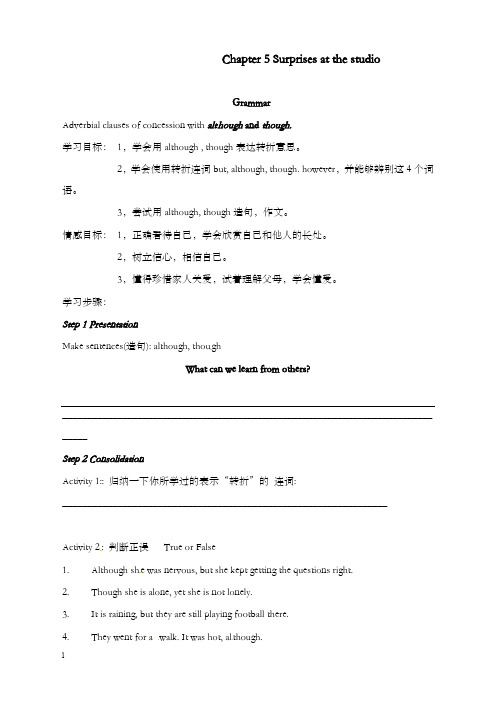
Chapter 5 Surprises at the studioGrammarAdverbial clauses of concession with although and though.学习目标:1,学会用although , though表达转折意思。
2,学会使用转折连词but, although, though. however,并能够辨别这4个词语。
3,尝试用although, though造句,作文。
情感目标:1,正确看待自己,学会欣赏自己和他人的长处。
2,树立信心,相信自己。
3,懂得珍惜家人关爱,试着理解父母,学会懂爱。
学习步骤:Step 1 PresentationMake sentences(造句): although, thou ghWhat can we learn from others?__________________________________________________________________________ _____Step 2 ConsolidationActivity 1::归纳一下你所学过的表示“转折”的连词:_________________________________________________________________Activity 2: 判断正误True or False1.Although she was nervous, but she kept getting the questions right.2.Though she is alone, yet she is not lonely.3.It is raining, but they are still playing football there.4.They went for a walk. It was hot, although.5.Though they are tired, but they are going on with their work.6.He went to work. It was Sunday, though.7.We try hard to learn English, but it is not easy.Activity 3:中考再现: 单项选择1. The lady donated a lot of money ____ she is not rich.A. ifB. becauseC.thoughD. so2. ---____ the soldiers are very tired, _____ they kept working.---They are great. We must learn from them.A. Because; /B. Though; /C. Because; soD. Though; but3. ____ they arrived early at the airport, they nearly missed theirflight.A. IfB. BecauseC. As soon asD. Although4. I fe ared that the film would be boring, _____ it turned out to be very exciting.A. andB. butC. soD. orActivity 4:Paraphrase改写句子1,Although Angela was unprepared, she was terrific.2,Although Miss Liu works hard, she is a little impatient.(没有耐心3,We are not clever, but we are hard-working.4,Chen Xiaoyin is good at running though she is not tall.Activity 5:Combining sentences 合并句子:用though/although/but/however连接下列每小题的两个句子,使之成为让步状语从句。
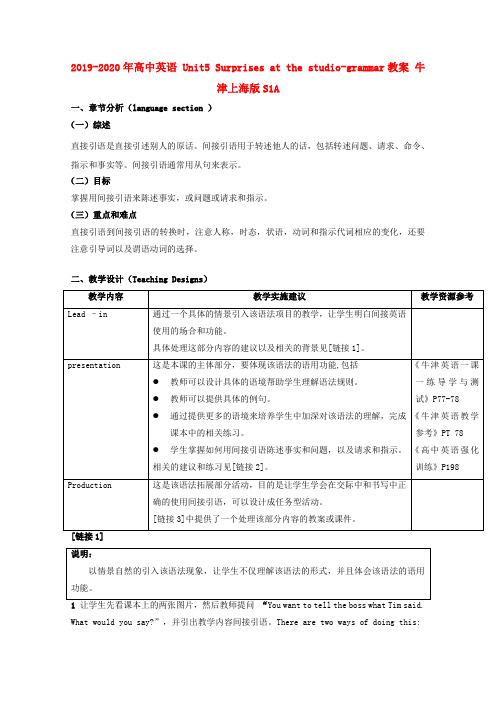
2019-2020年高中英语 Unit5 Surprises at the studio-grammar教案牛津上海版S1A一、章节分析(language section )(一)综述直接引语是直接引述别人的原话。
间接引语用于转述他人的话,包括转述问题、请求、命令、指示和事实等。
间接引语通常用从句来表示。
(二)目标掌握用间接引语来陈述事实,或问题或请求和指示。
(三)重点和难点直接引语到间接引语的转换时,注意人称,时态,状语,动词和指示代词相应的变化,还要注意引导词以及谓语动词的选择。
二、教学设计(Teaching Designs)What would you say?”,并引出教学内容间接引语。
There are two ways of doing this:You can repeat Tim’s words (direct speech).Tim said “We need another contestant.”Or you can use reported speech.Tim said that they needed another contestant.2 给学生更多富有情境性的例子,让学生体会,比较两种引语的不同,找出规律。
学生会得出结论:时态不同,结构不同(使用引号)You met Judy. Here are some of the things she said to you in direct speech:‘My parents are very well.’‘I’m going to learn to drive a car.’‘John has given up his job.’‘I can’t e to the party on Friday.’‘I want to go away for a holiday but I don’t know where to go.’‘I’m going away for a few days. I’ll phone you when I get back. ’Later you tell somebody what Judy said. You use reported speech:Judy said that her parents were very well.She said that she was going to learn to drive a car.She said that John had given up his job.She said that she couldn’t e to the party on Friday.She said that she wanted to go away for holiday but (she) didn’t know where to go. She said that she was going away for a few days and would phone me when she got back. [链接2]Am/is ---was are—were will---would have/has---had can ---could do /does---didMade---had made want/like/know—wanted/liked/knew etc2 师生共同归纳从直接引语到间接引语的时态和人称的变化。
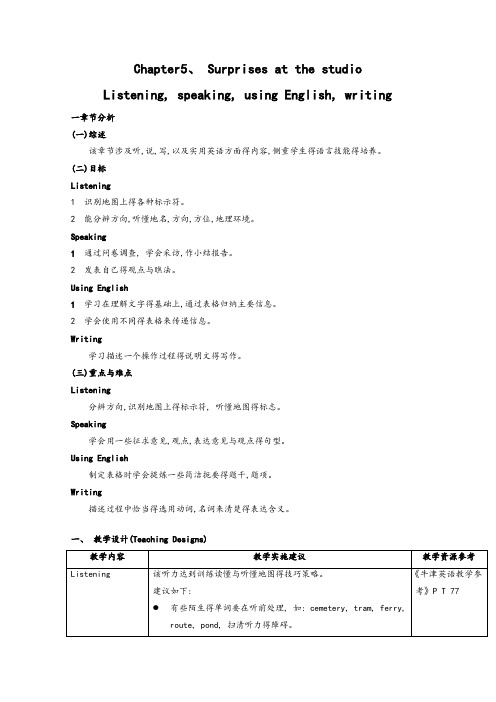
Chapter5、 Surprises at the studio Listening, speaking, using English, writing 一章节分析(一)综述该章节涉及听,说,写,以及实用英语方面得内容,侧重学生得语言技能得培养。
(二)目标Listening1 识别地图上得各种标示符。
2 能分辨方向,听懂地名,方向,方位,地理环境。
Speaking1 通过问卷调查, 学会采访,作小结报告。
2 发表自己得观点与瞧法。
Using English1 学习在理解文字得基础上,通过表格归纳主要信息。
2 学会使用不同得表格来传递信息。
Writing学习描述一个操作过程得说明文得写作。
(三)重点与难点Listening分辨方向,识别地图上得标示符, 听懂地图得标志。
Speaking学会用一些征求意见,观点,表达意见与观点得句型。
Using English制定表格时学会提炼一些简洁扼要得题干,题项。
Writing描述过程中恰当得选用动词,名词来清楚得表达含义。
一、教学设计(Teaching Designs)标示符来读懂地图。
2 播放录音,要求学生一边听懂问题并且记住问题,快速作出反应、然后请学生说出答案,全班校对。
3在完成听力练习后,让学生学习表达指明方向得一些常用短语,句子。
例如The road goes over the railway、A is to the east of BA is to the north-west of BA is in the south-west corner of the map、让学生互相提问,熟悉听懂方位得表达。
4 让学生自己设置场景,编对话:Suppose you have just e out of Horse Hill、 You want to visit Seaton、 You ask someone working there for help、[链接2]节目,涉及各个类型,制作一张英语版得一周电视节目单(TV Guide)。

上海版牛津英语S1A U4 Surprises at the Studio 学习辅导讲义Reading 词汇学习1.核心词汇surprise n. 意外事件;突然;惊奇,异例如:I have a surprise for you! 我要告你一件你意想不到的事!There are few surprises in your report. 你的告中没有多少出人意料的事情。
【注意】: adj. 令人惊奇的vt.使惊奇 ;奇surprised adj. 得惊奇的;感到意外的surprising adj. 令人惊奇的;出人意料的gasp vt. (因惊或害怕 )喘着气;气喘吁吁地例如:He gasped, “ Whatwas that noise?”他喘着气:“那是什么声音?”【注意】: vi. 喘气;喘息;渴望例如:She gasped at the wonderful view. 如此美景使她惊的倒吸了一口气。
faint vi.n. 喘气His breath came in short gasps. 他急速地喘着气。
昏厥,昏倒例如:I almost fainted when she told me. 她告我我差点昏死去。
【注意】: n. 昏厥,昏倒adj. 模糊的;虚弱的beat(beat beat beaten) vt. ;例如:He beat me at chess. 他下棋了我。
【注意】: vi. 打;拍打;有奏地舒与收n. 拍子;敲2. 拓展词汇contestant n. 参者;争者例如:Please welcome our next contestant. 迎我的下一位手。
【同根】: contest n.;比& v.争取得(比等),争例如:Three candidates contested the leadership.有三位候人角逐。
(vt.)3.词组和短语ahead of在⋯之前on one ’ s own独自的;独立的figure out 解决;算出;想出 stand for 代表;支持;象征4.句型学习It ’ s time for sth 是做⋯的候了。
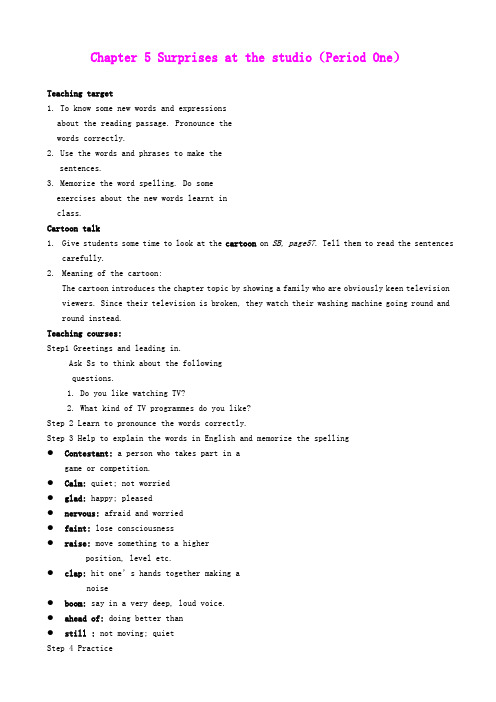
Chapter 5 Surprises at the studio(Period One)Teaching target1. To know some new words and expressionsabout the reading passage. Pronounce thewords correctly.2. Use the words and phrases to make thesentences.3.Memorize the word spelling. Do someexercises about the new words learnt inclass.Cartoon talk1.Give students some time to look at the cartoon on SB, page57. Tell them to read the sentencescarefully.2.Meaning of the cartoon:The cartoon introduces the chapter topic by showing a family who are obviously keen television viewers. Since their television is broken, they watch their washing machine going round and round instead.Teaching courses:Step1 Greetings and leading in.Ask Ss to think about the followingquestions.1. Do you like watching TV?2. What kind of TV programmes do you like?Step 2 Learn to pronounce the words correctly.Step 3 Help to explain the words in English and memorize the spelling●Contestant: a person who takes part in agame or competition.●Calm: quiet; not worried●glad: happy; pleased●nervous: afraid and worried●faint: lose consciousness●raise: move something to a higherposition, level etc.●clap: hit one’s hands together making anoise●boom: say in a very deep, loud voice.●ahead of: doing better than●still : not moving; quietStep 4 PracticeA Change the forms of the words1. recording (动词原形) ________2. glad (同义词) ______3. Director(动词原形) ______4. although (同义词) _______5. calm (反义词) _______6. unprepared (动词原形) _______7. clap (现在分词) ________8. final (副词) ______9. easy (副词) ______10. relax (形容词) _______ 或 _______B.根据句中的中文提示,完成句子.1. —How did Helen do in the competitiontoday?—Well, she ______________ (没准备的), so she __________ (觉得紧张) and didn’t do much well.3.—Do you want to _________ (上电视),Sandy?—Yes, of course. It’s my dream. Last year I ______ (参加) a singing competition on TV.3. Yesterday, Doctor Chen gave us a lecture on H1N1. ___________ (在结束的时候) the lecture, afew students ________________ (举手) and asked the doctor some questions. When he_________________ (回答完毕), all the students _____________ (鼓掌).4. Although other contestants ____________ (超越) him, he was still ____ (镇静的) and won a bigprize _________ (最后).5. The contest was very exciting, and all the contestants could ______________ (难以保持镇定).If I can ______________________________ (一直答对题), I must be the winner.Step 5. Read the words correctly.Step 6. ConclusionStep 7. Assignments.a. Recite the new words and expressions.(from drama to make-up artist)b. Listen to the tape about the reading passage three times.。
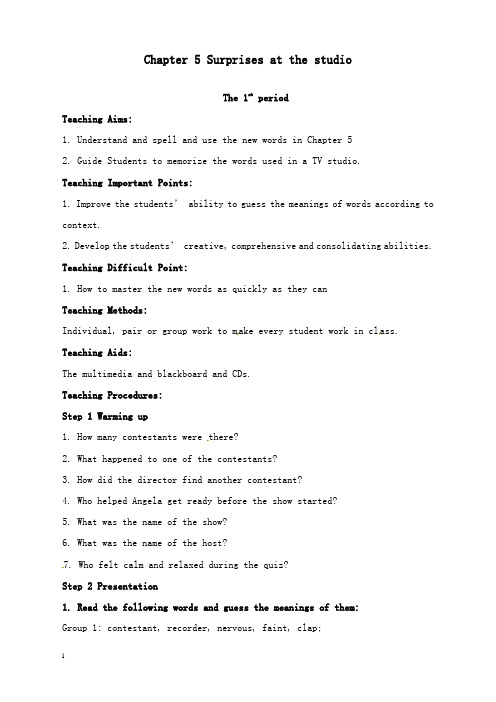
Chapter 5 Surprises at the studioThe 1st periodTeaching Aims:1. Understand and spell and use the new words in Chapter 52. Guide Students to memorize the words used in a TV studio.Teaching Important Points:1. Improve the students’ ability to guess the meanings of words according to context.2. Develop the students’ creative, comprehensive and consolidating abilities. Teaching Difficult Point:1. How to master the new words as quickly as they canTeaching Methods:Individual, pair or group work to m ake every student work in cl ass. Teaching Aids:The multimedia and blackboard and CDs.Teaching Procedures:Step 1 Warming up1. How many contestants were there?2. What happened to one of the contestants?3. How did the director find another contestant?4. Who helped Angela get ready before the show started?5. What was the name of the show?6. What was the name of the host?7. Who felt calm and relaxed during the quiz?Step 2 Presentation1. Read the following words and guess the meanings of them:Group 1: contestant, recorder, nervous, faint, clap;exit, button, arrow, volume.2. Sum upRecorder------recording------record (v & n)Group 2:We can put –er behind verbs to form nouns.cook ----------cookerteach ----------teacherdrive-----------driverStep 3 Consolidation and homeworkReview what we learnt today.1.Listen and read the new words in chapter five.2.Copy down the new wordsTeaching Postscript:The 2nd periodTeaching Aims:1. Know more about studio and TV quiz show.2. Train the students’ reading ability.Teaching Important Points:1. Improve the students’ ability to write a summary.2. Enable the students to understand the text better.3. Develop the students’ creative, comprehensive and consolidating abilities. Teaching Difficult Point:1. How to write a summary.2. The good behavior in a TV quiz show.Teaching Methods:Individual, pair or group work to make every student work in class.Teaching Aids:[The multimedia , the blackboard, courseware and CDs.Teaching Procedures:Step 1 Lead-inBrainstorming1. What do you know about …?Let the students look at the picture of the text book on page60. And ask them to match the words in the box with the pictures, and write the answers in the blanks according to their understanding.Keys: 1 drama 2. a quiz show 3. a music programme 4. the news2. Can you tell us other TV programmes ?For example: soap opera, movie, Super girl( or you can say Li Yuchun)Let the students try their best to do this one, if t hey have problem about words and expression, we can help them.Step 2 Review the new wordsWrite out the words according to its descriptions:1. boom: say in a very low , deep voice.2. clap: hit one’s hands together making a noise.3. contestant: a person who takes part in a game or competition.4. forward: towards a place in front of you.5. faint: lose consciousness.6. raise: move sth. to a high position7. rush: g o quickly.8. still: not moving; quiet9. terrific: very good; very skillfulHere we can use our courseware and we’d better give some sentences but not only the explanation, and we should let them translate this words into Chinses. Step 3 Read and think1. Who’s in the picture?2. What are they doing?3. What happened?4. Why did Debbie and Angela go there?5. What type of programme is being made in the TV studio? How do you know it? Step 4 HomeworkReview what we learnt today and pick out the useful expressionsRead the text and have a try to write a summary.Teaching Postscript:[The 3rd periodTeaching Aims:1. Review adverbial clauses of concession and master this with although and though.Teaching Important Points:1. Try to remember the rules about although and though.Teaching Difficult Point:How do students get the feeling to use articles correctly?Teaching Methods:Individual, pair or group work to make every student work in class. Teaching Aids:The multimedia and the blackboardTeaching Procedures:Step 1 Read the following sentences and pick out articles and say how they work:1. Although it is raining, we are still going out for dinner.2. Sam did quite well in the exam although he was unprepared.3. Though Gina is Australian, she speaks good Chinese.4. Although/Though it was still five o’clock, the lights were already on.5. Although/Though he is still very young, he is going very grey.6. Though she was nervous, (yet) she kept getting the questions right.7. She was nervous, but she kept getting the questions right.Step 2 PracticeMake sentences with although and though.• 1. Although Simon has made great progress in his studies.• 2. Tony found it difficult to talk to foreigners in English.• 3. Though it is Sunday• 4. She decided to go abroad to further her studies• 5. I could hardly understand what was being read• 6. Although milk is good breakfast• a although she was not well prepared.• b he still works really hard• c my mother got up early as usual.• d although he was reading loudly• e I prefer orange juice• f although he thought his English was perfect.Ask the students to do B according to the pictures.2. a Although it is difficult to skate, she enjoys skating.b She enjoys skating though it is difficult.3. a Although he is very old, he does t’ai chi every morning.b He does t’ai chi every morning though he is very old.4. a Although he was afraid, he learn to dive.b He learnt t o dive though he was afraid.5. a Although it is dangerous, they love climbing.b They love climbing though it is dangerous.Step 3 Consolidation and homework1. Review what we learnt today.2.Read the text.3.Finish the exercises on workbook.Teaching Postscript:The 4th peri odTeaching Aims:1. Keep on reviewing adverbial clauses of concession and master this with although and thoughTeaching Important Points:1. Memorize how to use although and though correctly.Teaching Difficult Point:1. How to learn them by heartTeaching Methods:Individual, pair or group work to make every student work in class. Teaching Aids:The multimedia and the blackboardTeaching Procedures:Step 1 RevisionStep 2 Grammar focus1. although 和though都可以引导让步状语从句。
沪教版牛津高一上册U4AI.【课前预习】阅读U4课文1,从每题所给的A、B、C和D四个选项中,选出最佳答案。
Surprises at the studioRead the excerpt from the novel Mandy and Angela Go to Europe. In this excerpt, Mandy and her friend Angela attend the filming of a TV quiz program.‘Five minutes until we start filming,’Shouted the director. ‘Is everyone ready?’ ‘I’m glad that I’m not one of the contestants!’whispered Mandy. ‘They must feel really worried now!’‘Oh, I would love to be a contestant,’ said Ang ela.The three contestants were sitting at their desks on the stage, waiting. The hot lights were shining down upon them. Suddenly, one of them, a woman, stood up and then fell forward across her desk.‘Oh, she’s fainted because it’s too hot,’ gasped Mandy. A cameraman helped the wo man off the stage.The director hurried down from the control room opposite th e stage. ‘We need another contestant before the show begins,’ he shouted. ‘Who wants to be on TV?’ Angela raised her hand. ‘You’re on!’ the director shouted. After he seated her on the stage, a make-up artist rushed forward. She quickly powdered Angela’s f ace and combed her hair.‘Ten seconds,’ shouted the director. ‘Smile, everyone. Cue Lester’ Everyone in the audience started clapping.The announcer’s voice boomed, ‘It’s time for Travel Quiz, a nd here’s your host, Lester Li!’ Lester L i came running out and stood in front of the desks. The quiz program began.Angela was terrific. Since she answered the questions easily, she was soon ahead of the other two contestants.Mandy, however, was tense. She sat on the edge of her seat and chewed her fingernails while she watched.Twenty-five minutes later, Angela had beaten the other contestants. She had to answer six more questions to win the grand prize.Mandy was so excited. She could hardly keep still. Angela kept getting the questions right. There was just one question to go.‘And finally, where is the Colosseum?’ asked Lester. ‘In Rome, Italy,’ replied Angela. ‘Right!’ shouted Lester, as the audience clapped. ‘You have won tonight’s grand prize----a trip for two to the lovely city of Pa ris!’1.At first, Mandy and Angela were ________.A. Contestants.B. Audience.C. Assistants.D. Directors.2.Why did the woman, one of the 3 contestants feel dizzy?A. Because she was ill.B. Because she was weak.C. Because it was in hot summer.D. Because the light let out too heat.3.Who became “another c ontestant” that replaced the woman f eeling dizzy?A. Angela.B. Mandy.C. Cue Lester.D. Lester Li.4.What does the underlined word terrific mean?A. terrible.B. exciting.C. excited.D. comfortable.5.How long did the quiz program last?A. 5 minutes.B. 25 minutes.C. More than 25.D. More than 5 minutes.6.In the phrase “s ix more questions”, six more means the same as _________ .A. 6 other.B. another 6.C. No more than.D. Not more than.7.Who is most likely to go to Paris with Angela?A. Cue Lester.B. Lester Li.C. Another contestant.D. Mandy.II.【词汇精讲】讲解U4课文1中的20个生词或短语1.studio n.播音室,演播室;电影公司;(画家或摄影师的)工作室;【常见搭配】a TV studio 电视演播室a recording studio 录音室Brad Pitt is making a film with one of the big studios. Brad Pitt正在为一家大制片公司拍摄一部电影。
Chapter5.Surprises at the studio-more reading一、章节分析(Reading section)(一)综述该章节是补充阅读材料,本文通过介绍娱乐科技的新进展—从以电视为主流的娱乐设备发展到以影碟机为潮流的娱乐产品,通过对比,阐明DVD的含义、优势和特点。
本章节的阅读设计旨在扩大学生的词汇量和增进学生的阅读的知识面。
(二)阅读目标)1 知识目标理解文章的大意和结构层次。
2 能力目标训练归纳段落大意和寻找关键信息和归纳成表格的能力,培养学生的阅读技巧。
3 情感目标感受到科技的高速发展。
(三)教学方法1.通过头脑风暴的形式来激活学生对该话题的背景知识。
(四)阅读重点和难点。
1.词汇学习1)核心词汇1)insert2)advantage3)viewing4)compare2)拓展词汇●various●function●pastime●versatile●crisp●smart●menu●therefore3) 词组和短语● a big step forward●figure out●no more…●wear and tear●sharp and crisp●because of●stand for●compared with…●as much as…2.句型学习1)One advantage of the DVD is that being digital, the picture quality is excellent. … Anotheradvantage of is that some DVDs can store as much as four hours of programmes.2)You can choose full screen or wide screen as you like.一、教学设计(Teaching Designs)2 让学生列举相对应的娱乐设备和新发明。
牛津高中英语说课Surprisesatthestudio说课
牛津高中英语说课 Surprises at the studio说课
一、教材分析:
本节课是牛津教材S1A Unit4的Reading: “Surprises at the studio”的第二课时。
这是一篇记叙文,文章讲述了发生在摄影棚里的突发事件和令人意外的惊喜。
故事的环境是一个quiz show的录播现场。
在场的不仅有台上的参赛选手,主持人,还有导演等一系列录制人员,以及现场观众。
故事情节紧紧围绕着文章题目“surprises at the studio”而展开。
Surprise by surprise,一波又一波把故事推向高潮。
整个故事中,针对现场气氛的'描写和各个人物的刻画是相当到位的。
简洁的语言,恰到好处的描写,使得故事中的人物角色生动活泼地展现在读者面前,同时也很自然地渲染出了录影棚里现场的气氛。
教师引领学生在回顾文章主要情节的同时去品味斟酌作者写作时的选词和用词。
虽然是一篇文字简单的记叙文,但通过教师的启发诱导,学生一样能在语篇中细细品味文字的魅力。
二、学情分析
本节课的教学对象是我校高一平行班学生。
高一学生目前还处于初高中学习的衔接过渡阶段,虽然英语学习已进行了多年,但学生们的英语口头表达能力和对语言品味欣赏的能力还有待于进一步地培养和充分地挖掘。
所以在课堂上,教师要不断地鼓励激发,使学生逐渐进入角色,并在教师创设的情境中得到实践和提高。
三、教学目标:
帮助学生复习课文主要内容;使学生掌握课文主要词汇(faint, gasp, shout, whisper, hurry down, rush forward, terrific, beat, win, tense, sit on the edge, chew one’s fingernails, hardly keep still…);培养学生细读文本,透析词汇,咬文嚼词的习惯,提升学生品味语言
的能力;让学生在合作学习过程中,运用已学词汇,锻炼口头表达能力。
四、教学步骤及设计:
1.教师以surprises作为切入点,使学生快速回想起故事主要情节。
借助文章中三个surprises将整节课进行串联。
2.课堂中,教师不是单一枯燥地讲授文中的主要词汇,而是通过启发式的提问,让学生通过思考,自己去文中发现主要词汇,体会其在特定语境中的意义和用法。
3.本节课中,教师将教学活动分成两大部分:
前一半侧重处理对场内气氛的描写。
整个教学过程是小步走,教学活动以师生对话为主。
教师深挖细节抛出问题,启发学生分析查找,让学生通过上下文的理解,自己在文中找出答案。
教师除了提问之外,还鼓励学生绘声绘色地大声朗读原文,在朗读的过程中解读词汇。
第二部分,让学生通过细读文本,去比较主要人物Mandy和Angela场上表现的不同。
学生同桌之间相互合作找出主要词汇,共同体味语言。
几个刻画人物形象的短语非常生动形象。
教师让学生通过肢体表演等方法对这些短语加深理解,同时通过联系学生真实生活,鼓励学生活学活用。
在解读个别词的用法时,也有适当的扩展
4.在post reading activity中,教师要求学生以小组为单位,自创一个小故事。
要求学生模仿课文,运用所学词汇,充分发挥想象力和创造力,使故事能引人入胜,充满惊喜和精彩。
同时要求学生在听别组同学presentation的同时,仔细听,认真记。
事后,对其他组的故事进行评价。
让学生带着任务去做听众,这样在活动中,各小组之间也能产生互动,组内组外共同交流。